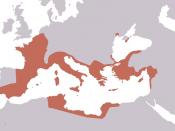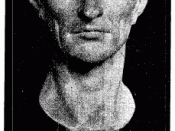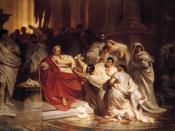The tragic flaw and the tragic hero
"He who will not reason is a bigot, he who cannot is a fool." -Sir William Drumman
Every man was given the natural ability to reason through situations and come to a conclusion by weighing the consequences. Every man, however, capable of this does not actively reason to come to a successful solution. Some choose not to reason, while others simply cannot due to their idealism. In any case the inability to reason becomes a flaw, and in the case of Julius Caesar, a tragic flaw. Reasoning is not inherently present in Marcus Brutus or Julius Caesar. Brutus cannot look past his ideological view of the world and therefore his reasoning is tampered with. Caesar, on the other hand, can reason but will not because he thinks that the word of Caesar is always correct. Both of these men exhibit this same flaw that eventually leads to their deaths.
Either of these men could be considered the tragic hero because they both possess the tragic flaw yet Brutus' nobility and ability to finally see his flaw, even though too late, is what sets the two characters apart making Brutus the tragic hero and the one the readers are cheering for.
Caesar was able to accomplish many things that Brutus was not but he could never do the most important which was recognize his own faults leaving him as the unchanged antagonist rather than the hero of the story. Caesar from the very beginning let his own ego interfere with his ability to reason. Calpurnia has the terrifying dream of Caesar's death and although at first he agrees to stay home his reason is swayed by Decius' ability to incite his ego by simply claiming that the senate had planned to give a...



Good
I have to agree with the previous comment, this is excellent work for 10th grade. Good job.
4 out of 4 people found this comment useful.